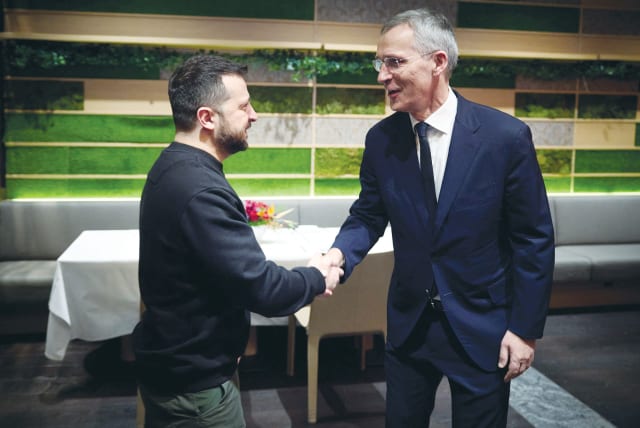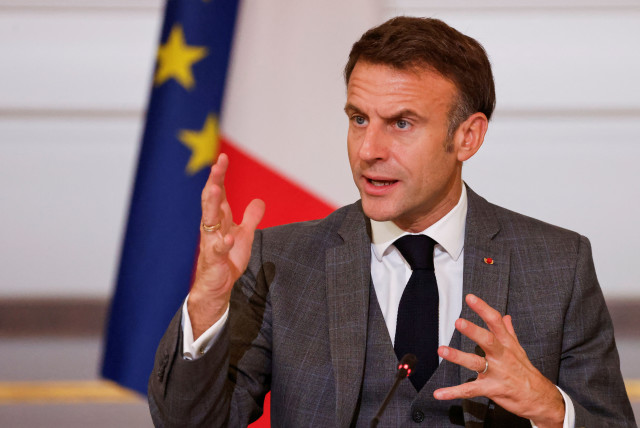NATO intervention in Ukraine appears to be all talk - opinion

Macron’s statement also comes at a time when the US position on support for Ukraine has been watered down due to partisan disputes in Congress.
In a statement that raises questions and surprises observers, French President Emmanuel Macron said, “There’s no consensus today to send in an official, endorsed manner troops on the ground. But in terms of dynamics, nothing can be ruled out,” in a position that marks the first time a Western head of state has spoken about the possibility of sending Western troops to the battlefield with Russia.
The statement comes at a critical time after Russian forces have taken control of the town of Avdiivka on the eastern Ukrainian front and Ukrainian ground forces retreat to take up a defensive position following their failed counter-attack – backed by extensive material and arms support from the West and
Macron’s statement also comes at a time when the US position on support for Ukraine has been watered down due to partisan disputes in Congress, as Republicans disagree over continuing the substantial military and material aid for Kyiv.
In Europe, Macron is leading efforts to create a coalition of European countries willing to supply Ukraine with multiple-launch rocket systems. On February 25th, two years into the war in Ukraine, a meeting, held in Paris, was attended by around 20 countries. France’s declared aim was to explore and examine all possibilities for effective support for Ukraine.
Officials in Paris wanted to dispel the impression that things are stagnating and reaffirm that they are not tired and are determined to stop the Russian invasion. They wanted to send a clear message to Putin that he cannot win against Ukraine. Although Ukrainian President Zelensky has thrown the ball in the court of his Western allies and reiterated that Ukraine’s victory over Russia “depends” on them, acknowledging that the failure of the counter-attack was a major blow to Kyiv, no new aid was announced at the Paris meeting, but an attempt was made to deliver the weapons that had been promised.
Ukraine claims that the delivery of Western weapons is being delayed, a real concern as the EU is struggling to meet its commitments, particularly with regard to the delivery of shells. That is why a Czech proposal to buy shells for the Ukrainian army not only from Europe but from all over the world was adopted at the Paris meeting.
In his comments on the escalation of the conflict with Russia, Macron agrees with British Prime Minister Rishi Sunak, who favors bolder measures to seize Russian assets. However, the deployment of troops hinted at by Macron, also to exert pressure on Russia, is out of the question for Sunak.
Germany, on the other hand, is reluctant to send Taurus cruise missiles (an advanced German surface-to-air missile system with a range of 500 km.) to Ukraine and is therefore further away from discussing the issue of troop deployment.
Other NATO countries also reject this French approach. NATO Secretary General Jens Stoltenberg confirmed that this is not among the proposed plans under discussion. Since the beginning of the crisis, NATO has refused to intervene directly in the war and has limited itself to providing assistance to Ukraine.
European countries' positions on Ukraine are heavily divided
European positions are clearly divergent, particularly between the three largest European countries. In contrast to the British position, German advisor Olaf Scholz refuses to supply the Ukrainian army with Taurus missiles to avoid provoking Russia. Macron, on the other hand, is hinting at the possibility of sending allied forces to Ukraine, a level of escalation that had not been hinted at directly or indirectly to date.
Der Tagesspiegel reports that Scholz entered directly into a conversation with Macron and confirmed that no soldiers from European countries or NATO member states would be sent to Ukraine, reminding the French president of the existing agreements between European countries. This disagreement suggests that Macron is taking a position that raises questions and triggers a search for motives and background.
It is safe to say that the United States will not support Macron’s vision, either through direct involvement or by giving the green light for any European country to send troops to Ukraine. The reason: the US is well aware of the consequences of a direct military confrontation between NATO and Russia, which could lead to a nuclear war.
As a result, President Joe Biden, who is already facing various problems around the globe and a decline in popularity due to his handling of strategic American interests in many areas, cannot add a new complication to his possible chances for a second term. It is also unlikely that any potential Republican president, especially former president Donald Trump, would support such a proposal.
The only remaining hypothesis is that the French president has taken a personal stance on sending troops to Ukraine. Given Macron’s similar previous positions, this is a legitimate assumption. But this stance has caused problems in French political and party circles, and some have called the idea madness. Russia is demonstrably a major nuclear power that has already hinted that it could resort to nuclear weapons in the event of an existential threat, particularly given the imbalance between the Russian army and NATO forces in the conventional field.
Russia has officially and directly announced that this option (intervention by one or more NATO members) would be considered a declaration of war with all its consequences. The deputy chairman of the Russian Security Council, Dmitry Medvedev, described Macron’s statement as a “verbal enuresis,” while the Kremlin spokesman described it as an announcement of an inevitable clash between Russia and NATO.
Given all this, and given Macron’s confirmation that he had spoken in full awareness of the possibility of sending Western troops to Ukraine and had carefully weighed and considered his words, observers believe that this idea may indeed have been discussed among European leaders, albeit in a narrow, secretive setting, given the increasing likelihood of a defeat or collapse of the Ukrainian army and its implications for European national security.
Macron’s statement could be a deliberate leak to take the pulse or to increase pressure on the US to speed up the mechanism for providing aid to Ukraine for fear of involving its European allies in a direct confrontation with Russia.
In any case, Macron’s declaration on sending troops to Ukraine remains a serious political event, even if it is a “test balloon,” as American newspapers have described it, which puts the French president in a difficult position to get out of this predicament he has put himself in.
French Foreign Minister Stephane Sejourne tried to defuse the crisis by saying that while the presence of Western soldiers in Ukraine was necessary to provide certain types of assistance, such as training and removing land mines, this did not mean that they were intervening in the conflict.
The writer is a UAE political analyst and former Federal National Council candidate.
Jerusalem Post Store
`; document.getElementById("linkPremium").innerHTML = cont; var divWithLink = document.getElementById("premium-link"); if (divWithLink !== null && divWithLink !== 'undefined') { divWithLink.style.border = "solid 1px #cb0f3e"; divWithLink.style.textAlign = "center"; divWithLink.style.marginBottom = "15px"; divWithLink.style.marginTop = "15px"; divWithLink.style.width = "100%"; divWithLink.style.backgroundColor = "#122952"; divWithLink.style.color = "#ffffff"; divWithLink.style.lineHeight = "1.5"; } } (function (v, i) { });

